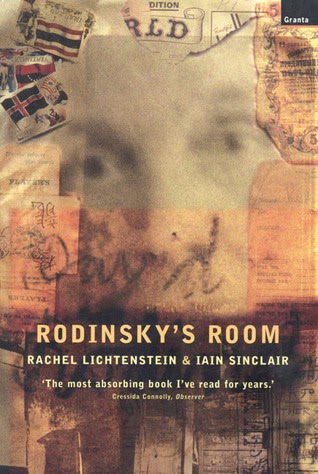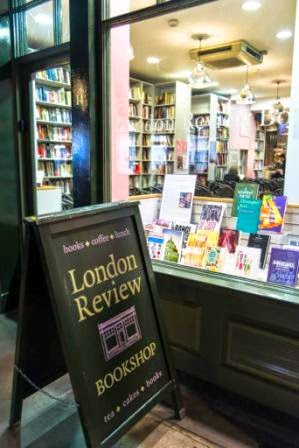“Why
do we react so strongly to certain places? Why do layers of story and meaning
build up around particular features in the landscape?”
These two questions are posed on
the flyleaf of Philip Marsden’s most recent book, Rising Ground. His book also lent its title to an interesting event
which I attended at the London Review Bookshop last Tuesday. Rising Ground – Place Writing Now
brought together Philip Marsden and two other writers, Ken Worpole, and my
friend, Julian Hoffman, in a discussion chaired by the Whitechapel Gallery’s
Film Curator, Gareth Evans, to unfold the question – what is place?
“Writing
about place,” is, according to the event blurb, “a sub-genre of travel writing that subverts it by being about staying
put, rather than moving.” It was a fascinating evening which certainly helped
broaden the horizons of the mind. Each of the three writers was in agreement
that the idea of place is intrinsically linked to perception. In using the
framing device of place there is a clear distinction between knowledge and
experience. We might know a particular landscape as intimately as another
person in the detailed terms of its geography, its topography, its history, or
how it might have changed or been changed over time, but that other person may well
have had a radically divergent experience of that same place to our own.
As Julian Hoffman writes in his
book, The Small Heart of Things --- “Place
has a profound bearing upon our lives, from the countries we are born into, or
end up inhabiting, to the light, landscape, and weather peculiar to our home
regions. Each has a say in shaping our cultures and souls.” Our
relationships to the places we inhabit or simply pass through can be deepened
through ‘an equality of perception’ if we only stop ourselves and take a moment
to examine it – perceptions small and fleeting can be just as significant to us
as grand vistas and imposing, centuries old scenery. Awareness is the key, as
Hoffman goes on to recount: “One autumn,
while putting the shopping in the bed of our truck, I watched a kestrel arrow
low over the supermarket car park, snatch a small mammal from an abandoned lot
piled high with rubble and debris, and settle on a hummock of broken concrete
beneath a streetlamp to feed. It was so close that I could make out the black
fretwork on its cinnamon back, and our eyes locked together when its head
suddenly swivelled. Shoppers pushed their trolleys past me, and I could hear
the slam of closing doors, but I was so caught up in the eyes of the kestrel
that I just stood there with a bag dangling from my hand.”
Each of the three writers spoke
about particular places they have come to know and explored intimately, which
they have then gone on to write about. For each, the motivations and modes of
perception may have been different yet all three were deeply rooted in the
concept of being at home. In this context, Hoffman’s favourite idea expressed
in the words of the poet, Rainer Maria Rilke, that “everything beckons us to perceive it,” was frequently quoted and
referred back to by each of the writers in relation to their own work and
experiences with regard to place. For Marsden it is a personal search for the
spirit of place; for Hoffman it is about being at home in a beckoning world;
and, for Worpole it is about questioning received opinions, and, in so doing,
forming our own ‘re-representations’ of what a particular landscape is, or
represents, to us personally.
Philip Marsden’s most recent book, Rising Ground, very
interestingly for me (although I’ve yet to read the whole book) explores the
wider locales around his home in Cornwall. Leafing through the book I can see
many references to places both widely known and more obscure which are very well
known to me having grown up during long childhood summers spent in that
particular county. It will be interesting to see how different or coincident my
experiences of these places will measure against his own. Julian Hoffman’s wonderfully
lyrical book looks at his adopted home in Greece by the Prespa Lakes, located
in a transnational boundary park whose shores are also shared by Albania and the
former Yugoslav Republic of Macedonia – with all the complicated cultural
history and diversity that such human imposed national boundaries have brought
to bear on the everyday lives of those people sharing a home and a personal
heritage in that locale. Ken Worpole’s most recent book, The New English Landscape, is a collaboration with the
photographer, Joseph Orton, which proposes a new paradigm for topographical
beauty based on the post-industrial landscape of the Thames estuary, another
part of the world closely connected to me as I now live only a few yards away
from the banks of this great river.
There are many ways to experience
and to describe place. Personal response is one means; another might be through
the stories of other people, of which the writings of Rachel Lichtenstein were
cited as a foremost example. Indeed, her Rodinsky’s Room (written with Iain Sinclair) is a fascinating book
– mysterious and moving by turns, in the narrative arc of her investigations
into the remnant world of one man’s vacant home, still filled after many
undisturbed years with all his abandoned possessions. A thoughtful exploration,
forlorn but ultimately uplifting in its sifting through the accumulated layers
of perception, projection, and the consequent misconceptions which seemed to
have accrued through time, until person and place are ultimately, in several
senses of the word, – relocated.
As Philip Marsden noted there can
be ‘a cacophony of interpretation’ which builds through time in relation to
particular landscapes. These can be both positive and negative. Whether it be a
depressive dismissal of a decaying post-industrial landscape, or the idealised
projections through which an unknowable Neolithic landscape might evocatively
enter and captivate our imagination, or vice versa – these surmises probably
say more about us and the nature of ourselves than the true essence of such a
landscape itself.
Writing about place can be a means
of ‘digging in and putting down roots,’ or it can be about looking back after
displacement and viewing the place from which we’ve come with eyes renewed; our
reflections become refracted, lingering resonances reverberating in unexpected
ways – we may even end up feeling closer to the place we’ve left simply because
we’ve left it. In this sense, opening yourself to a new way of perceiving
somewhere – ‘unfolding place’ – is a renewed way of experiencing it. As Ken
Worpole observed, accepting a ‘cookie cut’ notion of what a place is like merely on the say-so of other
people is simply a way of denying ourselves our own experiences, and thereby depriving
ourselves of our own intuitive responses, which – if we stopped to examine them
– may well be surprisingly different to those of the hive mind. Rural and urban
spaces need not necessarily be seen in opposition or viewed as enemies of one
another. They may even be closer (physically) and more closely interlinked (on
multiple levels) than we realise; by putting ourselves (physically and mentally)
in motion we can exchange one for the other more completely than we might
otherwise have assumed.
Just as those living transient
lifestyles in a constant state of motion – such as hunter-gatherer communities,
or nomadic shepherds, who continually relocate and renew their home-bases, and
so are seen to be idyllic, happy, and at ease in their landscapes, whereas
sedentary farmers are said to hate
the land which they feel chained to –
so we can see how perceptions of place drawn from outside and inside can differ
and perhaps are not so clearly cut after all. Just as landscapes can bleed
gradually, one into another, so too can our perceptions of place, as well as
other people, and our own individual and collective locations within these landscapes
which we have shaped into being as the places which we inhabit – the world
around us, which we call our own whilst simultaneously sharing it with others.
Rising Ground – Place Writing Now at the London Review Bookshop, well attended
with many thoughtful questions and observations from the audience, was a
thought provoking and enjoyable evening. One which certainly made me see the
world rather differently than I perhaps had done so before. I’m sure the
thoughts and ideas which this evening inspired in me, and which I’ve tried to
capture here, will linger long in mulling, and so permeate into my own
perceptions of place renewed.
See 'Person & Place' for my review of a similarly themed event on 'Capturing a Sense of Place' with the writers Mahesh Rao, Colin Thubron & Tracy Chevalier at Daunt Books earlier this year.


















